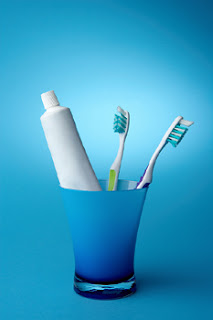January 13th, 2013

If you’re undergoing orthodontic treatment, brushing and flossing after every meal and snack is the only way to prevent plaque build-up, tooth decay and gum disease. Your teeth will need extra care, especially during treatment at our office. Our goal is for you to have a beautiful healthy smile, and in order for us to achieve this good hygiene on your end is very important. Food and particles are known to get trapped by brackets, wires, bands and appliances, and this can make it difficult to keep your teeth clean. Using a Waterpik is another great way to clean teeth and gums. Here are a few tips to help with keeping your teeth clean and healthy during your orthodontic treatment:
1. Brush after every meal or snack
2. Floss daily to remove trapped food and particles
3. Rinse after eating with mouthwash to kill any bacteria
4. Brush with a fluoride toothpaste and a soft-bristled tooth brush
5. Clean teeth with a proxabrush
6. Maintain regular check-ups with your general dentist throughout your treatment
We hope these tips help. For more information, we encourage you to give us a call, ask us on Facebook or ask us during your next adjustment visit!
January 6th, 2013
 The dreaded cold and flu season is here again! After recovering from your cold, one of the most important steps you can take to avoid becoming reinfected is replacing your toothbrush!
The dreaded cold and flu season is here again! After recovering from your cold, one of the most important steps you can take to avoid becoming reinfected is replacing your toothbrush!
Germs can linger on the bristles, and you risk prolonging your sickness by continuing to use the same toothbrush. Be smart - keep a spare, just in case! To protect your toothbrush from bacteria all year long, consider the following tips:
• Wash your hands before and after brushing
• Allow the brush to air dry after each use, harmful bacteria dies after being exposed to oxygen
• Store the toothbrush in an upright position to allow water to drain and dry faster
• Replace your toothbrush every 3-4 months. Worn bristles are less effective in properly cleaning your teeth, and can actually be damaging to teeth if used too long!
We hope these tips help! Feel free to give us a call or ask us on Facebook if you have any questions!
December 30th, 2012
 With the year almost over, we thought we would ask you, our dear patients: what was memorable about 2012 for you, and what are you looking forward to in 2013? Do you have a new year's resolution, or any exciting plans for the coming year?
With the year almost over, we thought we would ask you, our dear patients: what was memorable about 2012 for you, and what are you looking forward to in 2013? Do you have a new year's resolution, or any exciting plans for the coming year?
We want to wish all our patients, friends, family and all our dental and medical colleagues a happy and healthy New Year!
December 26th, 2012
Millions of patients undergoing orthodontic treatment will not be smiling this holiday season, and not because they didn't get the gift they wanted. These are people whose teeth and/or braces fall victim to the hard, chewy, gummy or sticky holiday treats.
We know orthodontic emergencies are never convenient nor timely. If you are a patient of record, we are committed to your oral health and are available to you. As a general rule, you should call our office when you experience severe pain or when you have a painful appliance problem that you can't take care of yourself. You might be surprised to learn that you may be able to temporarily solve many problems yourself until you schedule an appointment. When working with your appliances, you need to know the names of the parts of your appliances so you are able to identify what part is broken or out of place. After alleviating your discomfort, it is very important that you still call our office as soon as possible to schedule a time to repair the problem. Allowing your appliance to remain damaged for an extended period of time may result in disruptions in your treatment plan.
If you have a orthodontic emergency after regular office hours, please give us a call and follow the emergency prompts to contact our team! We hope you're having a great holiday season!






